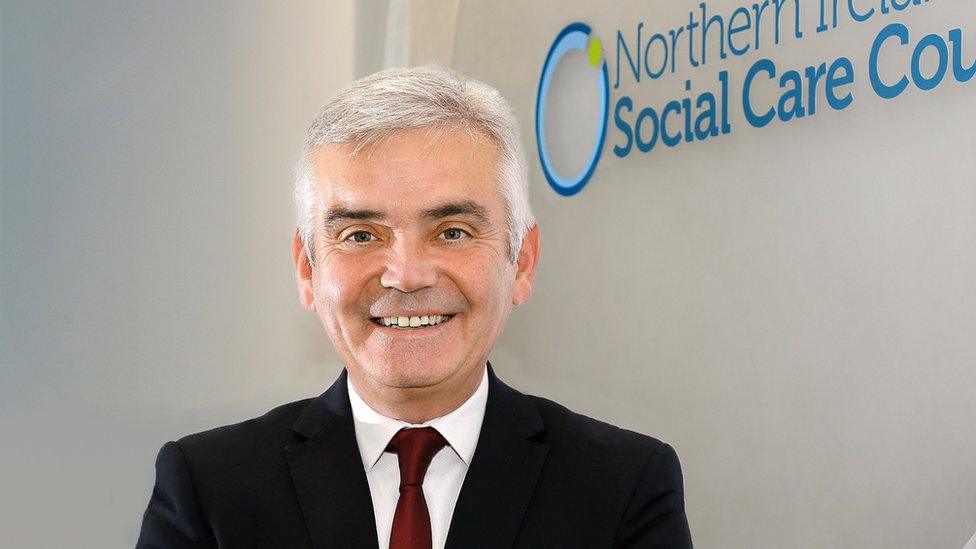Northern Ireland's social care workers 'must be more valued'
- Published
- comments
NI social care system 'stretched to the limit'
Northern Ireland's social care workers must be better paid and become a more valued part of the workforce, a new report urges.
The NI Social Care Council warns unless there are better working conditions and the profession is made more attractive, it will become unsustainable.
The call follows a predicted 15% increase or an additional 4,000 home care packages in 2020.
Currently, the adult social care sector accounts for 5% of NI's employment.
However, as Northern Ireland's population is expected to reach two million by 2034, there are calls that the workforce also needs to grow.

The adult social care sector accounts for 5% of Northern Ireland's employment
Colum Conway, the chief executive of the NISCC, said: "The social care workforce is our most valuable asset.
"To underestimate its value to society and its contribution to the transformation of our services will be to our detriment.
"Supporting employment for over 100,000 people, the social care sector makes a vital contribution to the citizens of Northern Ireland.
"It helps people live as independently as possible, protects people from harm in vulnerable situations and offers essential help at times of crisis.
"Its value is also evident on the impact it has on reducing delayed discharge, avoidable admissions and inappropriate long stays in hospital."
Demand for social care is growing. An ageing population, a rise in complex and long-term conditions and a reduction in public sector resources all highlight the need for more investment in adult social care.
Demand for home care packages alone is expected to rise by 15% in three years.
But in order to roll that out, the NISCC argues that the social care profession needs to become more attractive and sustainable.

Colum Conway said the workforce makes a huge contribution to the NI economy
Some of those working in the sector earn just over £16,000 annually.
The report, 'Social Care Matters', argues that workers in that industry require a career structure, better wages, terms and conditions and respect from their employers.
Contribution 'overlooked'
Mr Conway said the workforce also makes a huge contribution to the Northern Ireland economy.
"The contribution it makes to the economic growth in Northern Ireland - through jobs, through business, through skills development and through community cohesion is often overlooked," he said.
"As the largest part of the health and social care workforce, with 34,000 registered staff (5% of NI workforce), it is estimated that a further 9,000 jobs through more than 500 employers are supported here.
"With the local economy benefiting by £821m per annum, the sector is therefore integral to both the social and economic well-being of Northern Ireland.
"As pressures and demands increase; with an aging population, a rise in complex and long-term conditions and a reduction in public sector resources, the time is now for local and central government, providers of social care and those engaged in supporting business development, to take collective leadership and work in partnership to invest in a sustainable social care workforce for the future."
- Published2 November 2017

- Published11 October 2017

- Published6 October 2017
